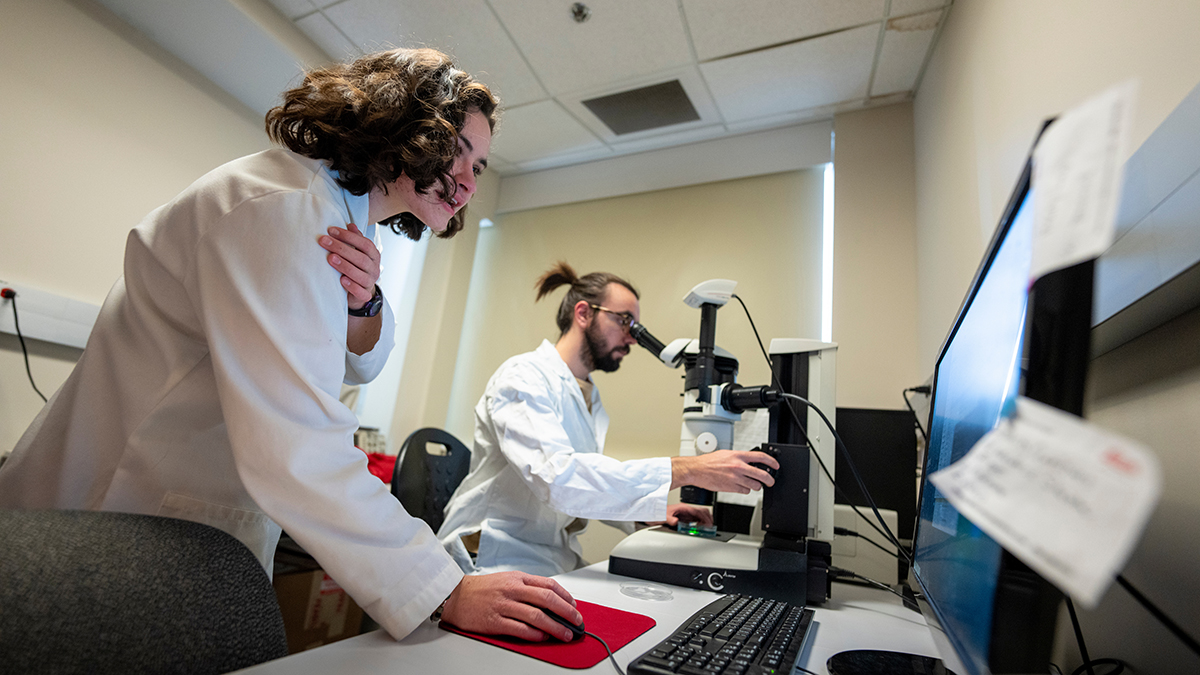
Renewed NIH grant to expand UMaine’s impact on biotech workforce
The National Institutes of Health (NIH) renewed the University of Maine’s first T32 institutional predoctoral training grant, expanding support for doctoral students in biomedical science and engineering.
UMaine’s T32 program, launched in 2019, was the first of its kind at the state’s flagship university and remains one of only two active programs in Maine. Led by co-principal investigators Clarissa Henry of UMaine and Lucy Liaw of the MaineHealth Institute for Research (MaineHealth), the five-year renewal award expands annual slots from six to eight doctoral students.
UMaine’s program has already delivered dividends for the Pine Tree State’s innovation economy:
- 80% of graduates remained in Maine, now working at top labs including The Jackson Laboratory’s (JAX), Maine Health and Mount Desert Island Biological Laboratory, bolstering the state’s biotech sector.
- 25% of trainees secured their own NIH fellowships (F31s).
The program provides competitive fellowships that allow students like Ashley Soucy (‘23G) to gain hands-on experience by working at medical research labs across Maine. Before graduating, Soucy worked in Liaw’s lab at MaineHealth during her fellowship.
“Dr. Liaw continuously encourages her trainees to apply for opportunities that enhance their scientific education and professional development. Her guidance, combined with the opportunities provided through the Graduate School of Biomedical Science and Engineering and the T32, helped me to grow as a scientist and prepared me for the next steps in my career. I am grateful to have been part of a program that invests so strongly in its students and the future of biomedical research,” said Soucy, who is now a senior project manager at JAX’s Rare Disease Translational Center.
The program is administered through UMaine’s Graduate School of Biomedical Science and Engineering (GSBSE), a statewide Ph.D. initiative that brings together faculty and resources from UMaine, the MaineHealth, JAX, Mount Desert Island Biological Laboratory and the University of New England. Students will tap into GSBSE’s robust network of co-mentors as they learn to pursue the transdisciplinary collaboration that propels modern biomedical research.
“This renewal attests to the quality of innovation and mentorship opportunities created by our robust network of collaborators on campus and across the state,” said Clarissa Henry, UMaine professor of biological sciences and principal investigator on the project. “We are proud that the majority of our graduates are building their careers here in Maine, fueling the growth of the biosciences sector and advancing research focused on pressing health challenges.”
Liaw, faculty scientist at the MaineHealth and co-principal investigator, spoke to the value of the program’s collaborative model. “The T32 has created a true statewide training network. By connecting students with mentors and resources across Maine’s institutions, we’re equipping the next generation of scientists with the skills to thrive in a team-based, transdisciplinary research environment,” she said.
Eligible GSBSE students may apply for a T32 fellowship in their second or third year of study. The most recent call for proposals was issued this summer, and new fellows will be selected in September 2025 for the 2025–26 academic year.
Contact: Erin Miller, erin.miller@maine.edu, Caroline Cornish, Caroline.Cornish@mainehealth.org
